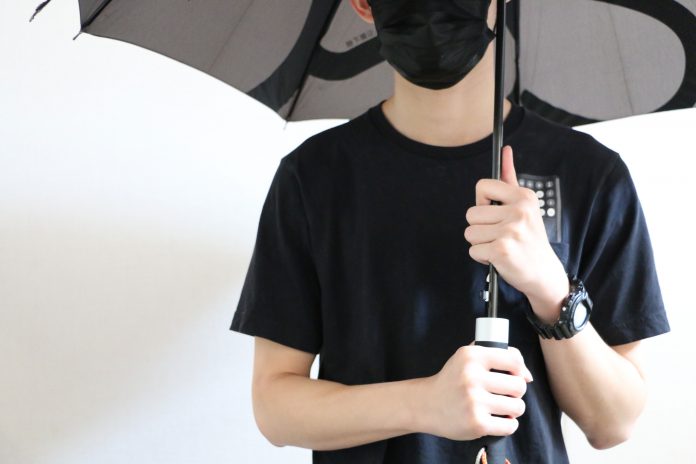
Protesters take precautionary measures to protect their privacy.
Reporters: Soohyun Kim & Howard Li
Fears underneath the black
As the anti-extradition bill movement continues, a sea of black floods the streets in different parts of Hong Kong nearly every weekend. Hundreds of people wearing black risk their lives every week for the same purpose—to stand up against what they see as creeping interference of Beijing.
Hong Kong, the former British colony which is guaranteed a high degree of autonomy from Beijing until 2047, saw a public backlash against the now withdrawn law that would have allowed people to be extradited to China for trials, throughout the summer.
“Everyone is separating their lives of protesting and normal life,” a front-line protester who prefers to be identified as a recent graduate from the Chinese University of Hong Kong (CUHK) says.

In a bid to protect his own privacy, he wears “Black Bloc”, a widely used terminology referring to a black outfit – black T-shirt, black sanitary mask, black cloth – commonly worn by anti-government protesters.
Wearing black is not the only measure he takes to protect his identity and prevent himself from being arrested. He also uses a different cell phone with a different contact book and SIM card that allows him to stay off the grid.
“Even if I get arrested, they (police) can’t find anything from it,” he says.
Another individual near the frontline, a first aider who requested to be identified as a student of the CUHK, worries that the police might spy on him. He says that as a first aider, he does not fear to show his face, but many in his team use fake names and hide their identities from each other.
“It’s not a matter of privacy. We don’t want to be arrested by the police, because what we are doing is breaking the law. If the police don’t arrest us, I don’t think we have to hide our identities,” he says.
Protesters enable alphabetical and biometric locking systems on their smartphones and disable the functioning of whatever surveillance systems they deem could expose their identities. Some change their clothes, use fake names on social media and put up umbrellas during protests to block police’s cameras from capturing their images.
The underlying fear is that revealing their identities at public demonstrations can result in atrocious consequences – getting arrested and charged by the police.
Protesters’ concerns over their identities and personal information are also reflected in their reaction to the smart lamppost project, which was being tested by the Hong Kong government as a part of the smart city development scheme.
Demonstrators view government lampposts with suspicion and they believe it is a measure to step up surveillance. They tore down lampposts in Kowloon Bay, Kwun Tong and Kai Tak in late August, although the government denied the accusation and said that the lampposts were for monitoring weather, traffic conditions and air quality. But many protesters believed they could be traced by lampposts suspected to be equipped with artificial-intelligence-powered surveillance software. They fear identity cards or facial-recognition cameras on poles might expose their whereabouts and what they have done during the movement. They are also worried that their data and personal information might be transferred to the Chinese government.
Protection of individuals’ information
It is, however, unlikely that the government will disclose individuals’ information without consent, according to Michael Jackson, associate professor of law at the University of Hong Kong.
Jackson points out Hong Kong has Personal Data Privacy Ordinance (PDPO), a set of technology-neutral and principle-based guidelines that safeguard the privacy of individuals’ data or “any information which relates to a living individual and can be used to identify that individual. It must also exist in a form which accesses to or processing of is practicable.”
As the government is subject to the PDPO, any unintended use of collected data can result in a breach of the ordinance. However, Jackson states that public venues consist of individuals’ privacy interests in a public place, which limits the ability to claim personal privacy rights.
“Once you place yourself out there, it is difficult to argue that the mere collection of your image is a breach of your privacy rights,” he says.
In view of the PDPO, Jackson reckons that the law has not kept up with technology because some protections are not clearly applied to current technological information, such as IP addresses which can reveal one’s location and activity.
In a written reply, Privacy Commissioner for Personal Data Stephen Wong Kai-yi says the ordinance is a technology-neutral legislation, which provides room for continued applicability against changes in time.
“Personal data privacy right is not absolute. It has to be balanced by other considerations such as public interest, public safety, public order, and security,” he notes. “The application of data protection principles and provisions of the Ordinance may be exempted in the cases of the prevention or detection of crime, the apprehension, prosecution or detention of offenders.”
Lack of trust
Another increasing concern that protesters have is the lack of trust in the government as law enforcement agents use arbitrary methods to arrest them, as noted by Lokman Tsui, assistant professor at the School of Journalism and Communication in CUHK.
In a poll of 1,023 respondents released by Hong Kong Public Opinion Research Institute this August, public distrust level of the Hong Kong government hit a historic record with 50.8 per cent showing extreme distrust. This is the highest level since the former British colony was handed back to China in 1997.
“When you have a situation where it’s not clear which law is going to be used (and) how. Then, that creates a lot of distrust and paranoia among the people,” Tsui says.
Tsui thinks surveillance is very one-sided in Hong Kong, meaning that local authorities have laws and technology at their disposal to look at citizens, but citizens have very limited means to monitor the authorities.

“We never know when we are being watched, what they are collecting, how long have they been watching you,” he says.
He points out two situations that aggravate the issue; unclear guidelines and the special relationship between Hong Kong and China.
First, Tsui points out Hong Kong law enforcements can enquire a service provider for metadata of an individual for investigative purposes. Metadata refers to the data that describes other data. Service providers, who do not have specific baselines on which they cannot reveal user data, can share them under law enforcement request. Once the data is collected, it is unclear how it will be used against the people, in this case, the protesters.
Tsui adds that the barrier is very low in accessing data for law enforcers because they do not necessarily need a search warrant to request for relevant information for investigative purposes.
Apart from unclear rules, the extent to which Hong Kong law enforcement shares data with Chinese law enforcement is obscure. Tsui explains: “Hong Kong and Beijing are two different legal jurisdictions that are not subject to mutual legal assistance treaty, an agreement between two countries on what conditions you give data people and how they share the data.”
Law enforcement agencies can also seek help from companies offering device-unlocking services and software to access or copy private data on locked smartphones, whether it runs Android or IOS, according to Charles Mok, a legislative councillor of the Information Technology constituency. These circumstances collectively make people more alert to their privacy and information.
Meanwhile, on October 4, the Hong Kong government implemented the anti-mask law under the Emergency Regulation Ordinance as an attempt to stop violence on the streets.
The new law forbids people wearing masks at demonstrations. It authorises the police to ask people to remove their masks at protests, helping them identify the people at public gatherings, irrespective of its legality. If a person is found to have violated, the offender is subject to one-year imprisonment and a fine of HKD 25,000. With the anti-mask law enforced, over 77 have been arrested within three days of enactment, while concerns over identity protection persist as protesters continue to flood the streets.
Edited by Johanna Chan
http://varsity.com.cuhk.edu.hk/index.php/2019/11/unease-beneath-the-black/
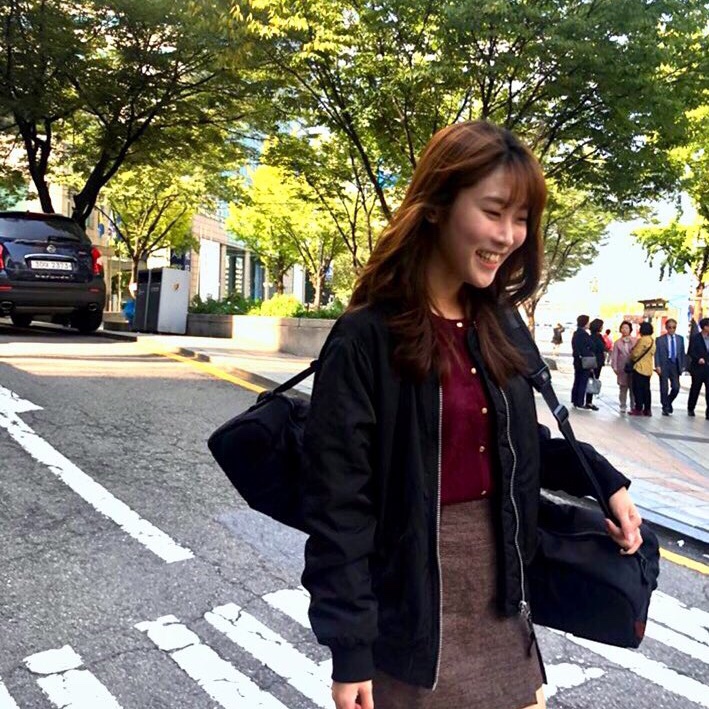
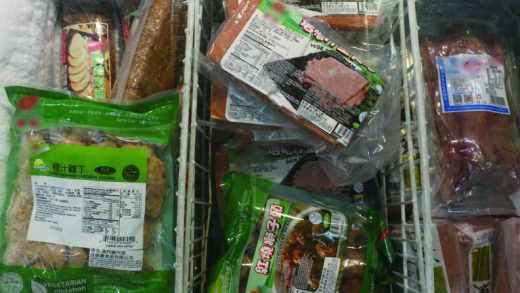
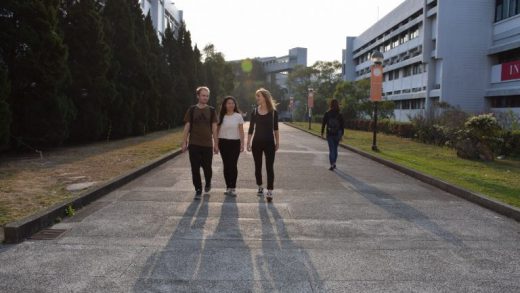
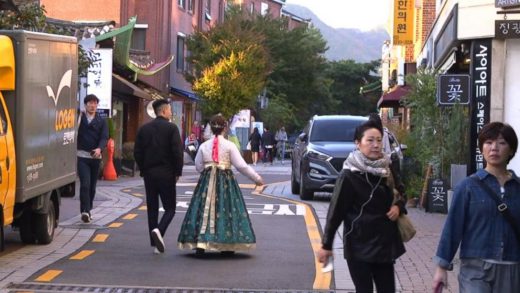
Hey, thanks for the blog post. Really thank you! Much obliged. Sandra Sterling Swec
I have read so many articles on the topic of the blogger lovers but this post is truly a nice post, keep it up. Batsheva Brett Kenti
Wonderful post! We will be linking to this great content on our site. Keep up the great writing. Misti Jdavie Champaigne